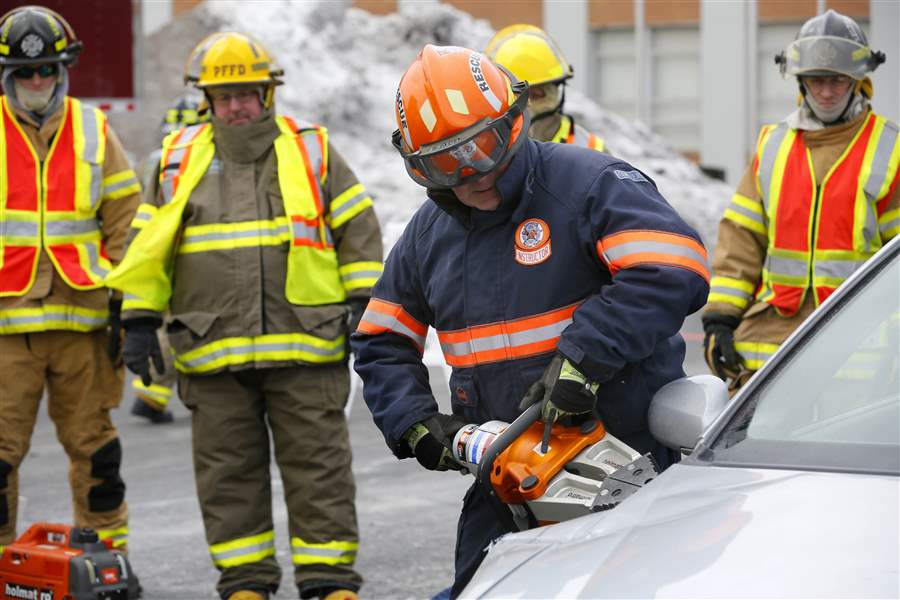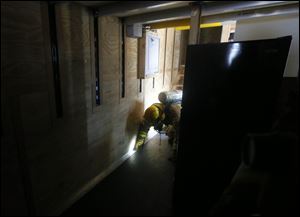
REMINDERS THAT CAN SAVE LIVES
Emergency responders attend Bowling Green class
Firemen’s association puts on annual school at university
3/17/2014
Peter Fiset, a trainer with the Northwestern Ohio Volunteer Firemen’s Association, right, shows firefighter students how to use tools to free trapped people in a Bowling Green State University lot.
The Blade/Amy E. Voigt
Buy This Image

Peter Fiset, a trainer with the Northwestern Ohio Volunteer Firemen’s Association, right, shows firefighter students how to use tools to free trapped people in a Bowling Green State University lot.
It’s a subject that makes the most seasoned firefighter tearful: Recalling the death of a comrade who fell in the line of duty.
Steve Kimble, 55, who retired as fire chief of the Dublin Fire Department in October, said one of his most vulnerable moments occurred several years ago when he was participating in a ceremony to honor a firefighter who had died.
“I saluted the firefighter’s 8-year-old son,” Mr. Kimble recalled, as he spoke to a room full of firefighters from throughout northwest Ohio on Sunday.
“The boy looked at me and said, ‘You salute just like my father used to.’ ”
The boy’s words cut through him like a knife and served as a reminder that people’s lives are at stake every time firefighters respond to an emergency, he said.
PHOTO GALLERY: Fire school at BGSU
Mr. Kimble was one of several presenters participating in the Northwestern Ohio Volunteer Firemen’s Association annual fire school at Bowling Green State University.
More than 1,100 firefighters and emergency personnel attended classes ranging from medical to agricultural emergencies, methamphetamine labs, hazmat/weapons of mass destruction, fire and explosion investigations and military and commercial aircraft response, said Bob Warnimont, fire school co-chairman.
Other topics included homeland security issues and firefighting experiences, such as the “Everyone Goes Home Program,” which addresses the role of leadership, accountability, culture, and knowledge that increases the chances that firefighters return from emergencies alive.
Mr. Warnimont, a retired Perrysburg Township firefighter, said the popular and free fire school event allows firefighters opportunities to continue to learn about new skills, techniques, and technology.
One of the best changes in the industry is the inclusion of female firefighters, he said.
“It gives you more manpower, especially during the daytime” he said. “In the old days, men would work other jobs during the day, and women would stay at home.
“In Toledo there are a lot of women firefighters, and they’re moving up the ranks.”

Tim Leeper of the Rawson Fire Department crawls through an ‘apartment’ as he seeks a ‘victim’ during firefighter training.
Although many topics are covered at the event, “the main goal of any fire department is do your job and get home safely,” Mr. Warnimont said. “Hopefully, we’ll never have another tragedy like we had in Toledo.”
Two Toledo firefighters — Pvts. James Dickman and Stephen Machcinski — were killed Jan. 26 while searching for potentially trapped residents in a devastating North Toledo apartment building fire.
Ray Abou-Arab, 61, who owns the building at 528 Magnolia St., has been charged in Toledo Municipal Court with two counts of aggravated murder and two counts of aggravated arson in relation to the fire.
Mr. Abou-Arab, who has pleaded not guilty, is scheduled for a pretrial hearing in the case on Thursday.
Mr. Kimble, an advocate operations/liaison for the program, reminded his class of 30 that complacency is a firefighter’s worst enemy.
His tips included wearing seatbelts when traveling to a fire and stopping at red lights and stop signs to make sure traffic is at a halt.
The fire school featured various vendors selling and displaying the latest gear and technology.
Warren Fire Equipment Inc.’s booth included custom-made turnout gear that promises to provide firefighters maximum protection.
At the other end of its range of offerings were bottles of patented, Warren Fire Department “hot sauce” that promise to fire up your bland meals, said Mike Kelly, a sales representative for the equipment company.
Mr. Kelly, 45, said technological advances in equipment and clothing for firefighters have come a long way since he started fighting fires in 1987 at the age of 18. He began his career fighting wildfires in Montana.
“When I started, I wore a cotton, duck-tail coat, hip wader boots and red plastic gloves,” he said. “If your ears started to burn, it meant it was time to get out of there.”
On Sunday, Mr. Kelly was showing off three-pound helmets that he said offer better protection than the 15-pound helmets that many fire departments are using.
His Scott brand turnout gear, he said, featured tough outer-shell material that protects the wearer from nails, glass, and flames, and the jacket’s thermal liner offers protection from the heat and has a moisture barrier that pulls heat away from the skin.
But Mr. Kimble reminded his class that it doesn’t matter how technologically advanced their clothing and equipment are if they don’t wear and use it properly.
Always make sure to follow all safety procedures during emergency situations, he said.
He also encouraged firefighters to exercise and stay in shape.
According to studies, half of all line-of-duty deaths are because of heart attacks, Mr. Kimble said.
“One serious problem we found is that 70 percent of fire departments lacked fitness and health programs,” he said.
Kerrie Hutchison, a firefighter for the Montpelier Fire Department, said Mr. Kimble’s session was a painful reminder of how dangerous her job can be.
But the reminder is necessary, she said.
“We all know that we have a job, and we know that we could die,” Ms. Hutchison said. “But it’s not something I really think about, and I should. What would happen to my daughters if I died? How would they react? How would they feel?
“That’s something we should all think about so we don’t become complacent.”
Contact Federico Martinez at: fmartinez@theblade.com or 419-724-6154.